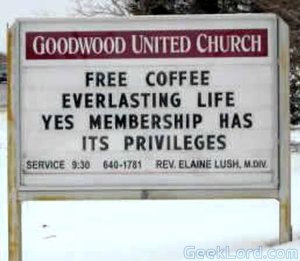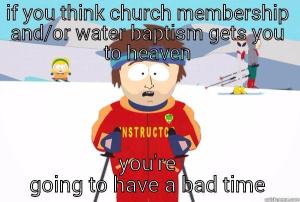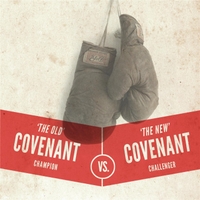Blog Archives
IS CHURCH MEMBERSHIP BIBLICAL? (3 of 5)

“No longer will a man teach his neighbor”
I “came to Christ,” or better said, “Jesus called me to Him” through the words and life of Pastor Raz and the bands Petra and Stryper. I’ve grown in my relationship with God through the life and teaching of dozens of godly men and women since who have served as friends, pastors, teachers, authors, speakers, and voices calling from the wilderness. I would not be who I am today without the love, teaching, accountability, and guidance of these men and women. And this without “membership” to a church, denomination, or creed.
Unlike what the Gospel Coalition or any church that requires our membership tells us, we are commanded to be independent of one another and not dependent upon one another for our salvation, obedience, or relationship with Jesus Christ. We all agree that salvation—a relationship with Jesus Christ through His Spirit—is not dependent upon others, right? So why do those who push membership believe “independence” is such a sin?
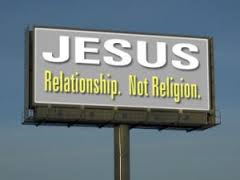 “For if the [old] covenant had been faultless, then no place would have been sought for a second…. For this is the [new] covenant that I will make… I will put My laws in their mind and write them on their hearts…. None of them shall teach his neighbor, and none his brother; saying, ‘Know the Lord,’ for all shall know Me…. In that He says, ‘A new covenant,’ He has made the first obsolete” (Heb 8.7-13). The old covenant requires, no demands, that “the lips of priests [or pastors, prophets, or popes] should keep knowledge, and people should seek the law from his mouth; for he is the messenger of the Lord” (Mal 2.7). How many Christians today believe that seminary qualifies men and women to teach God’s Word and that they alone should “keep knowledge” and that we who are not schooled should “seek the law from [their] mouths?” Is this an old or new covenant belief?
“For if the [old] covenant had been faultless, then no place would have been sought for a second…. For this is the [new] covenant that I will make… I will put My laws in their mind and write them on their hearts…. None of them shall teach his neighbor, and none his brother; saying, ‘Know the Lord,’ for all shall know Me…. In that He says, ‘A new covenant,’ He has made the first obsolete” (Heb 8.7-13). The old covenant requires, no demands, that “the lips of priests [or pastors, prophets, or popes] should keep knowledge, and people should seek the law from his mouth; for he is the messenger of the Lord” (Mal 2.7). How many Christians today believe that seminary qualifies men and women to teach God’s Word and that they alone should “keep knowledge” and that we who are not schooled should “seek the law from [their] mouths?” Is this an old or new covenant belief?
Unschooled Men
“When they (rulers and elders of the people—Act 4.8) saw the courage of Peter and John and realized that they were unschooled, ordinary men, they were astonished and they took note that these men had been with Jesus” (Act 4.13). In other words, these men would not have qualified to preach behind the pulpit of most of today’s churches. Their only qualification was that they had a personal relationship with Jesus Christ, independent of an organizational membership or denominational accreditation.
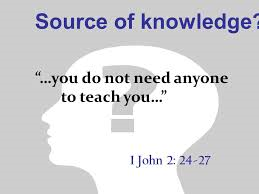 “As for you, the anointing you received from Him remains in you, and you do not need anyone to teach you” (1John 2.27). This verse sounds a lot like independent thinking to me. Luke even found noble those who tested the validity of Paul’s words against the rest of Scripture (Ac 17.11) and Paul himself urges us to “present yourself to God as one approved… [by] correctly handling the word of truth” (2Tim 2.15). The old covenant requires schooled men to train the unschooled. The new covenant urges all to be studied and approved.
“As for you, the anointing you received from Him remains in you, and you do not need anyone to teach you” (1John 2.27). This verse sounds a lot like independent thinking to me. Luke even found noble those who tested the validity of Paul’s words against the rest of Scripture (Ac 17.11) and Paul himself urges us to “present yourself to God as one approved… [by] correctly handling the word of truth” (2Tim 2.15). The old covenant requires schooled men to train the unschooled. The new covenant urges all to be studied and approved.
Am I accountable for submitting to false teaching?
Those who are members of one church or denomination are often required to submit to the teaching of “flawed elders,” whether they agree with it or not. (http://www.thegospelcoalition.org/article/is-church-membership-really-required). Should new covenant Christians submit to “flawed elders” and pastors simply because they are members, or should they study for themselves the Truth of God’s Word?
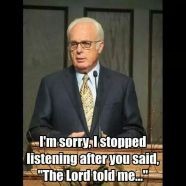 Every book of the New Testament warns “there will be false teachers among you” (2Pt 2.1) who will “peddle” and “distort the word of God” (2Cor 2.17; 4.2). Blind submission to “flawed elders” will inevitably lead to belief in what is false. Even Hebrews which says to “remember your leaders, who spoke the word of God” and “obey your leaders and submit to their authority” warns us to “not be carried away by all kinds of strange teachings” (13.7-17). Dependence upon the authority of others is no excuse for a lack of independent study of God’s Word. Those who fall for false teaching are as accountable as those who teach it. “Consider carefully what you hear… with the measure you use it, it will be measured to you—and even more” (Mk 4.24).
Every book of the New Testament warns “there will be false teachers among you” (2Pt 2.1) who will “peddle” and “distort the word of God” (2Cor 2.17; 4.2). Blind submission to “flawed elders” will inevitably lead to belief in what is false. Even Hebrews which says to “remember your leaders, who spoke the word of God” and “obey your leaders and submit to their authority” warns us to “not be carried away by all kinds of strange teachings” (13.7-17). Dependence upon the authority of others is no excuse for a lack of independent study of God’s Word. Those who fall for false teaching are as accountable as those who teach it. “Consider carefully what you hear… with the measure you use it, it will be measured to you—and even more” (Mk 4.24).
The question we must ask is this: does membership bound me to manmade doctrines or train me to study God’s spoken Word independent of manmade traditions?
IS CHURCH MEMBERSHIP BIBLICAL? (1 of 5)
One of my “pet peeves” about congregational gatherings is the dogmatic push for church membership. Maybe it’s because I spiritually “grew up” in parachurch groups and military chapel systems where membership was implied through consistent attendance and not complicit acceptance of denominational doctrine. Sure, I understand that church membership is of great logistical importance to modern congregations and that for some, belonging to a fellowship necessitates formalities. However, when church membership becomes a requirement it mutates into something more than a mere convenience.
What is “Church?”
We all know that “Church” is not a where, but a whom; not an edifice but an edifying body of believers building one another up in Christ. All Christians also understand that we belong to the universal body of Christ not when we sign a paper, but because we are adopted as His sons and daughters through the indwelling of His Spirit (Gal 4.6). So why do some believe a pledge of allegiance to an organization is required?
An article on gospelcoalition.org about the requirement for church membership stated, “being a part of the universal church without submitting to a local church is not possible, biblical, or healthy…. Every letter in the New Testament assumes Christians are members of local churches…. Independence—the desire to choose for yourself what’s right and wrong—is at the heart of sin. You need the humility lesson of submitting to flawed elders” (http://www.thegospelcoalition.org/article/is-church-membership-really-required).
Old or New Covenant?
Most Christians define “church” similar to what the Gospel Coalition and other denominational organizations do: a local congregation led by an ordained elder or pastor, meeting in a sanctified edifice, and consisting of a laity who gives and serves separate from a clergy who shepherds and preaches. This construct is what the Bible calls “the old covenant” with the expectation that anyone who is following Jesus will comprehend, adhere to, and inevitably become a member of the new covenant.
The old covenant requires our dependence upon an appointed, ordained, and educated priest, prophet, pope, or pastor. The new covenant states, “none of them shall teach his neighbor, and none his brother” (Heb 8.10) imploring us ALL to mature to teachers, not babies dependent upon the milk of others’ knowledge (Heb 5.11-14).
The old covenant “had ordinances of divine service and the earthly sanctuary” (Heb 9.1) requiring “church” to be housed in a sanctified facility. The new covenant says “for where two or three come together in my name,” there is Church—whether where we come together is a home, a restaurant, or a park (Mt 18.20). Old covenant church is a where and when; new covenant is who and why.
The old covenant requires the priest to complete a duty dissimilar to the laity. The new covenant teaches that we are all priests (1Pt 2.9), called to ministry (2Cor 5.17-20), and required to do “our part” as a member of Christ’s Body (Eph 4.16).
Therefore, the question we must ask is this: are you becoming a member of the old or new covenant?



